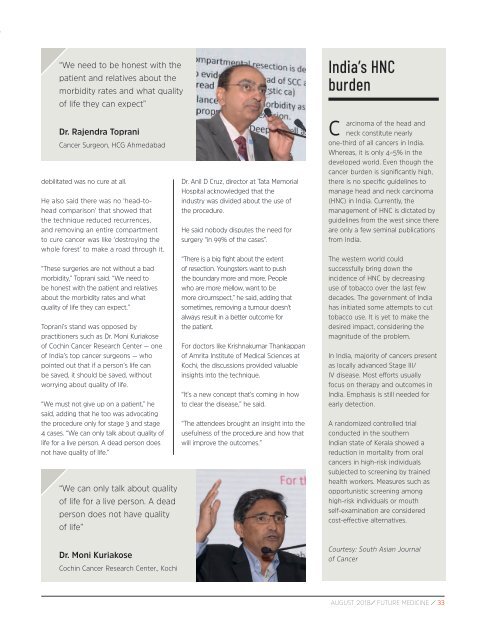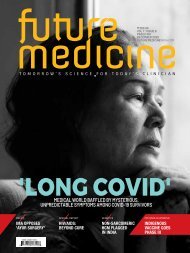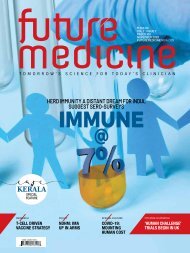FM AUGUST 2018 ISSUE1 - digital edition
You also want an ePaper? Increase the reach of your titles
YUMPU automatically turns print PDFs into web optimized ePapers that Google loves.
“We need to be honest with the<br />
patient and relatives about the<br />
morbidity rates and what quality<br />
of life they can expect”<br />
Dr. Rajendra Toprani<br />
Cancer Surgeon, HCG Ahmedabad<br />
debilitated was no cure at all.<br />
He also said there was no ‘head-tohead<br />
comparison’ that showed that<br />
the technique reduced recurrences,<br />
and removing an entire compartment<br />
to cure cancer was like ‘destroying the<br />
whole forest’ to make a road through it.<br />
“These surgeries are not without a bad<br />
morbidity,” Toprani said. “We need to<br />
be honest with the patient and relatives<br />
about the morbidity rates and what<br />
quality of life they can expect.”<br />
Toprani’s stand was opposed by<br />
practitioners such as Dr. Moni Kuriakose<br />
of Cochin Cancer Research Center — one<br />
of India’s top cancer surgeons — who<br />
pointed out that if a person’s life can<br />
be saved, it should be saved, without<br />
worrying about quality of life.<br />
“We must not give up on a patient,” he<br />
said, adding that he too was advocating<br />
the procedure only for stage 3 and stage<br />
4 cases. “We can only talk about quality of<br />
life for a live person. A dead person does<br />
not have quality of life.”<br />
“We can only talk about quality<br />
of life for a live person. A dead<br />
person does not have quality<br />
of life”<br />
Dr. Moni Kuriakose<br />
Cochin Cancer Research Center., Kochi<br />
Dr. Anil D Cruz, director at Tata Memorial<br />
Hospital acknowledged that the<br />
industry was divided about the use of<br />
the procedure.<br />
He said nobody disputes the need for<br />
surgery “in 99% of the cases”.<br />
“There is a big fight about the extent<br />
of resection. Youngsters want to push<br />
the boundary more and more. People<br />
who are more mellow, want to be<br />
more circumspect,” he said, adding that<br />
sometimes, removing a tumour doesn’t<br />
always result in a better outcome for<br />
the patient.<br />
For doctors like Krishnakumar Thankappan<br />
of Amrita Institute of Medical Sciences at<br />
Kochi, the discussions provided valuable<br />
insights into the technique.<br />
“It’s a new concept that’s coming in how<br />
to clear the disease,” he said.<br />
“The attendees brought an insight into the<br />
usefulness of the procedure and how that<br />
will improve the outcomes.”<br />
India’s HNC<br />
burden<br />
C<br />
arcinoma of the head and<br />
neck constitute nearly<br />
one-third of all cancers in India.<br />
Whereas, it is only 4–5% in the<br />
developed world. Even though the<br />
cancer burden is significantly high,<br />
there is no specific guidelines to<br />
manage head and neck carcinoma<br />
(HNC) in India. Currently, the<br />
management of HNC is dictated by<br />
guidelines from the west since there<br />
are only a few seminal publications<br />
from India.<br />
The western world could<br />
successfully bring down the<br />
incidence of HNC by decreasing<br />
use of tobacco over the last few<br />
decades. The government of India<br />
has initiated some attempts to cut<br />
tobacco use. It is yet to make the<br />
desired impact, considering the<br />
magnitude of the problem.<br />
In India, majority of cancers present<br />
as locally advanced Stage III/<br />
IV disease. Most efforts usually<br />
focus on therapy and outcomes in<br />
India. Emphasis is still needed for<br />
early detection.<br />
A randomized controlled trial<br />
conducted in the southern<br />
Indian state of Kerala showed a<br />
reduction in mortality from oral<br />
cancers in high-risk individuals<br />
subjected to screening by trained<br />
health workers. Measures such as<br />
opportunistic screening among<br />
high-risk individuals or mouth<br />
self-examination are considered<br />
cost-effective alternatives.<br />
Courtesy: South Asian Journal<br />
of Cancer<br />
<strong>AUGUST</strong> <strong>2018</strong>/ FUTURE MEDICINE / 33


















